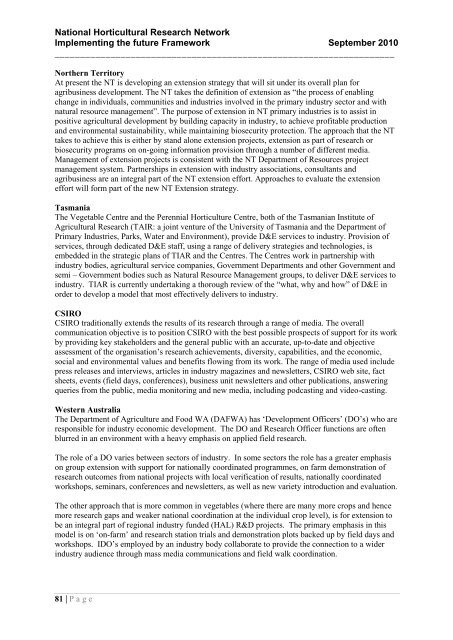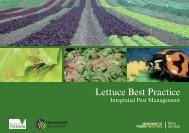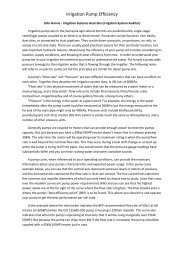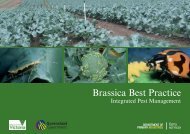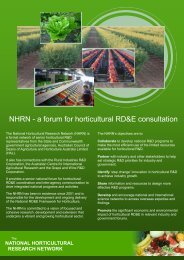National Horticultural Research Network - Horticulture Industry ...
National Horticultural Research Network - Horticulture Industry ...
National Horticultural Research Network - Horticulture Industry ...
Create successful ePaper yourself
Turn your PDF publications into a flip-book with our unique Google optimized e-Paper software.
<strong>National</strong> <strong>Horticultural</strong> <strong>Research</strong> <strong>Network</strong><br />
Implementing the future Framework September 2010<br />
___________________________________________________________________<br />
Northern Territory<br />
At present the NT is developing an extension strategy that will sit under its overall plan for<br />
agribusiness development. The NT takes the definition of extension as “the process of enabling<br />
change in individuals, communities and industries involved in the primary industry sector and with<br />
natural resource management”. The purpose of extension in NT primary industries is to assist in<br />
positive agricultural development by building capacity in industry, to achieve profitable production<br />
and environmental sustainability, while maintaining biosecurity protection. The approach that the NT<br />
takes to achieve this is either by stand alone extension projects, extension as part of research or<br />
biosecurity programs on on-going information provision through a number of different media.<br />
Management of extension projects is consistent with the NT Department of Resources project<br />
management system. Partnerships in extension with industry associations, consultants and<br />
agribusiness are an integral part of the NT extension effort. Approaches to evaluate the extension<br />
effort will form part of the new NT Extension strategy.<br />
Tasmania<br />
The Vegetable Centre and the Perennial <strong>Horticulture</strong> Centre, both of the Tasmanian Institute of<br />
Agricultural <strong>Research</strong> (TAIR: a joint venture of the University of Tasmania and the Department of<br />
Primary Industries, Parks, Water and Environment), provide D&E services to industry. Provision of<br />
services, through dedicated D&E staff, using a range of delivery strategies and technologies, is<br />
embedded in the strategic plans of TIAR and the Centres. The Centres work in partnership with<br />
industry bodies, agricultural service companies, Government Departments and other Government and<br />
semi – Government bodies such as Natural Resource Management groups, to deliver D&E services to<br />
industry. TIAR is currently undertaking a thorough review of the “what, why and how” of D&E in<br />
order to develop a model that most effectively delivers to industry.<br />
CSIRO<br />
CSIRO traditionally extends the results of its research through a range of media. The overall<br />
communication objective is to position CSIRO with the best possible prospects of support for its work<br />
by providing key stakeholders and the general public with an accurate, up-to-date and objective<br />
assessment of the organisation‟s research achievements, diversity, capabilities, and the economic,<br />
social and environmental values and benefits flowing from its work. The range of media used include<br />
press releases and interviews, articles in industry magazines and newsletters, CSIRO web site, fact<br />
sheets, events (field days, conferences), business unit newsletters and other publications, answering<br />
queries from the public, media monitoring and new media, including podcasting and video-casting.<br />
Western Australia<br />
The Department of Agriculture and Food WA (DAFWA) has „Development Officers‟ (DO‟s) who are<br />
responsible for industry economic development. The DO and <strong>Research</strong> Officer functions are often<br />
blurred in an environment with a heavy emphasis on applied field research.<br />
The role of a DO varies between sectors of industry. In some sectors the role has a greater emphasis<br />
on group extension with support for nationally coordinated programmes, on farm demonstration of<br />
research outcomes from national projects with local verification of results, nationally coordinated<br />
workshops, seminars, conferences and newsletters, as well as new variety introduction and evaluation.<br />
The other approach that is more common in vegetables (where there are many more crops and hence<br />
more research gaps and weaker national coordination at the individual crop level), is for extension to<br />
be an integral part of regional industry funded (HAL) R&D projects. The primary emphasis in this<br />
model is on „on-farm‟ and research station trials and demonstration plots backed up by field days and<br />
workshops. IDO‟s employed by an industry body collaborate to provide the connection to a wider<br />
industry audience through mass media communications and field walk coordination.<br />
81 | P a g e


